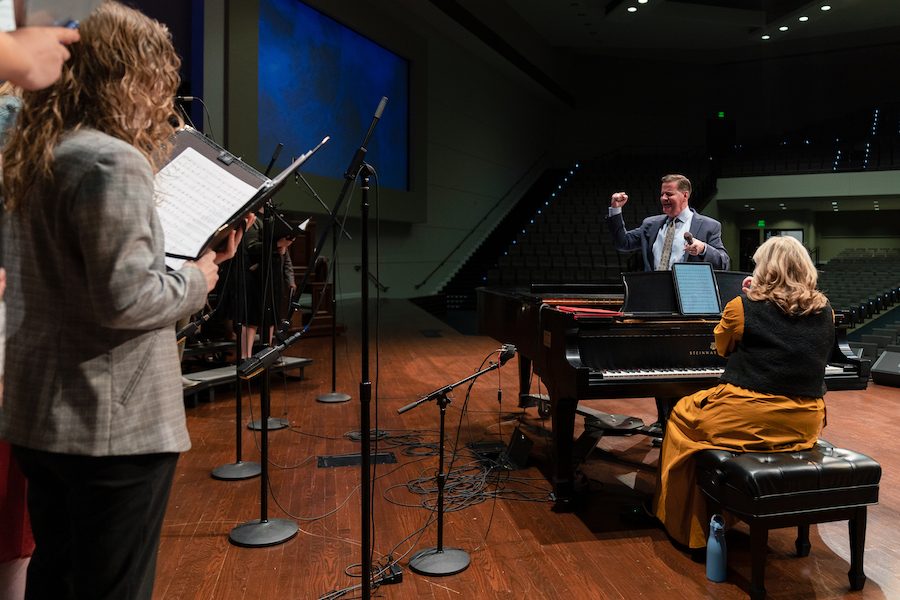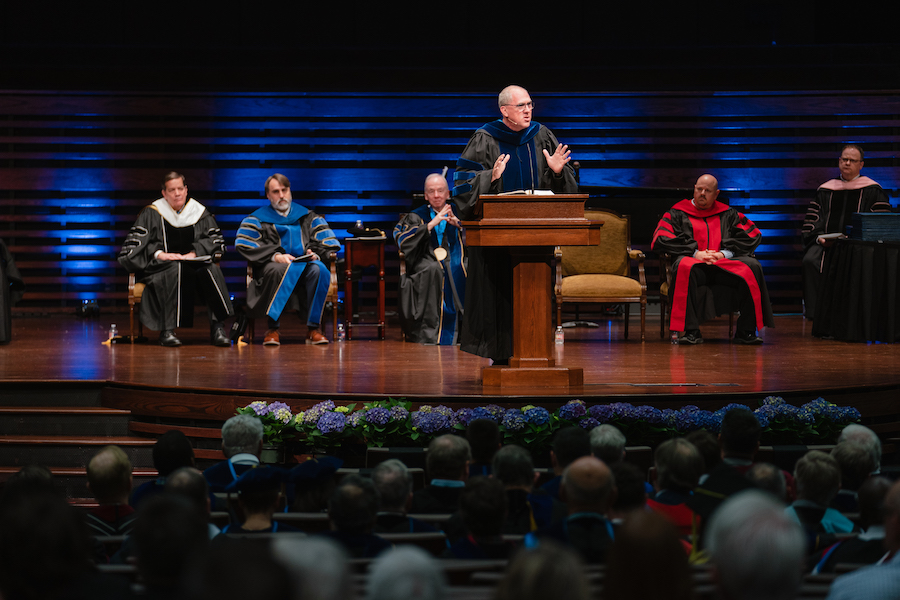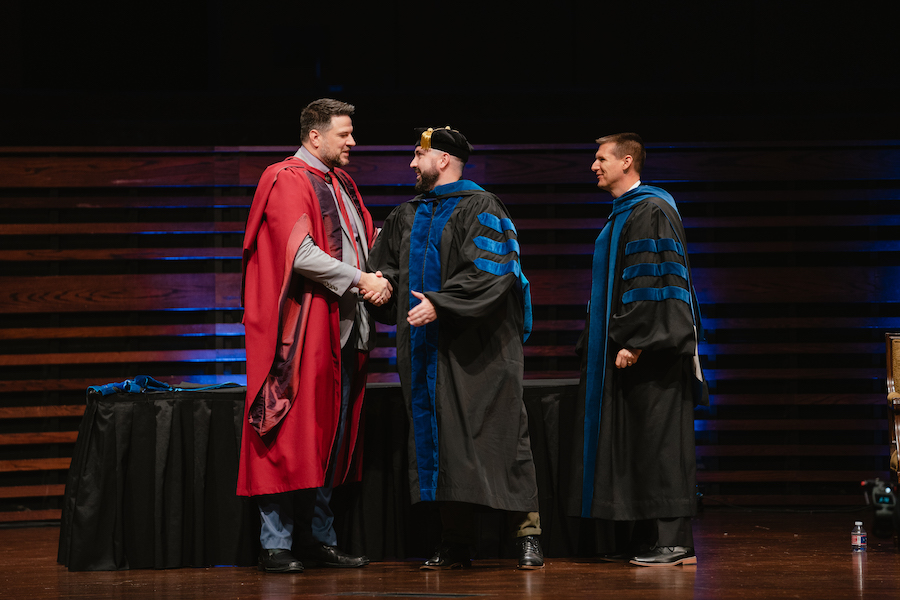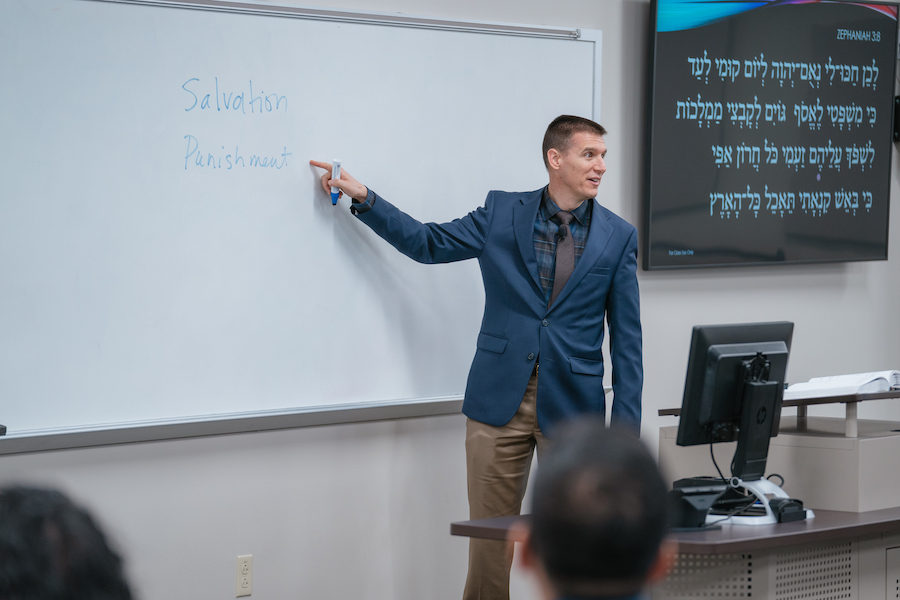3rd annual preaching conference provides tools for text-driven preaching
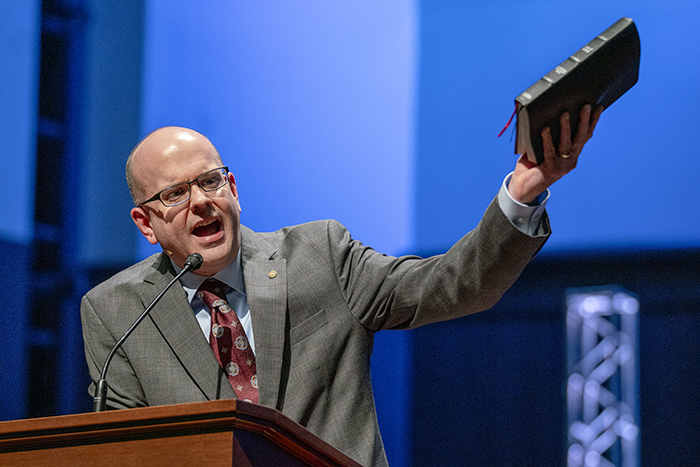
Southwestern Seminary’s third annual Text-Driven Preaching Conference, March 4-6, offered pastors, teachers and church leaders practical and compelling tools for effective biblical exposition. The three-day conference offered six plenary sessions, 48 breakout sessions on wide-ranging topics, and a pre-conference workshop devoted to the process of crafting a text-driven sermon.
Southwestern Seminary President Adam W. Greenway led out in the first plenary session on Monday evening, preaching from Acts 2:14-21. In his sermon, he delivered a message on the necessity for text-driven preaching, stating that the Word of God is an anchor amid tumultuous and confusing times in the broader culture.
“If there was ever a time where we need a more certain sounding word from God, it is now,” Greenway said. “In this culture, in this climate, in this context, we desperately need to hear the preaching of the Word of the living God.”
Much like Paul reminds the Jewish people of Joel’s prophesy, Greenway said preachers must direct people back to the text of Scripture—to its promises and truth.
The culture’s confusion, Greenway continued, demands text-driven preaching and an ability to articulate a biblical worldview with clarity. “If we can’t point people to the inerrant, inspired and infallible Word of God,” Greenway said, “then [the culture] will continue to be adrift.”
Finally, Greenway concluded that text-driven preaching is necessary because there are people who desperately need to hear it and “searchers who need to find salvation.”
“That’s why this seminary, as long as I have the opportunity to serve as president here, will be unequivocally committed to the priority of preaching—text-driven, Bible-centered preaching—in all that we do,” Greenway said.
Following Greenway was Phillip Pointer, senior pastor of Saint Mark Baptist Church in Little Rock, Ark. Preaching from 1 Corinthians 3:10-15, Pointer delivered a simple yet important message: “Be careful how you build.”
Citing the passage’s instruction to build with care, Pointer said ministry should be done in the same way. “I think we mix up sometimes the ‘to’ and ‘for’ of ministry,” he said. “We do ministry ‘to’ people, but we do ministry ‘for’ God.”
“As God sought to live in the hearts of humanity, the absolute depravity of our souls prevented us from qualifying for renovation,” Pointer said. “The Gospel does not make men better. The Gospel makes men new.”
Just as building with cheap materials will only yield cheap results, he added, ministry and preaching requires sacrifice, preparation and “attentiveness to Scripture and prayer.”
“There are no shortcuts to Sunday,” Pointer said.
Kyle Walker, vice president for student services at Southwestern, opened the Tuesday series of sessions, speaking from Job 38-42. He recalled an ad for a cellphone touted as being “life-proof”—equipped to take any abuse hurled at it through normal living.
“Are you life-proof?” he asked the conference attendees. “Do you have the ability to survive life’s most difficult trials?”
Job appeared to be life proof, Walker said—“he was righteous and he was rich … but life happened to Job.” When “God said that Job was the godliest man ever—the greatest man of the East,” Satan rained down torment on Job, again and again, to prove Job weak—but Job’s faith held firm.
“Life happened to Job, and he fell to the ground,” Walker said. “But what did he do on the ground? He worshipped.” Then Satan sent unrelenting pain, and still Job stood firm.
“But then Job’s faith begins to weaken, and he questions God’s powers and goodness,” Walker said. “He begins to ask why.”
God questioned Job in return, driving home the point that He is divine, and we are not. He then spoke of massive behemoths to stir fear in Job. “He takes him to a prehistoric stock show to drive home His point: ‘As powerful as they are, I am infinitely more powerful,’” said Walker.
“Pastors, preachers, brothers, ministers—why do you serve God?” Walker asked. “When the successes and praise and applause aren’t there, do you still serve God? We must trust God’s heart and plan, even when we don’t understand. … If your faith is life-proof, yes, you can.”
In the following plenary session, Noe Garcia, senior pastor of North Phoenix Baptist Church, preached from 2 Corinthians 1:8-11. He began his sermon with five confessions from a self-reliant preacher who operated from pride in the pulpit. “Self-reliant ministers,” he concluded, “always lead themselves to self-destructive paths.”
“Your charisma, your talents and your skills can draw a crowd, but only the Spirit of God can transform it,” Garcia said.
As Garcia continued in his message, he explained that all who enter the vocational ministry should expect to experience affliction. Though this affliction may take various forms, he said its purpose is to be evidence of one’s need for God, not self.
“My prayer for everybody in this room, including myself, is that the moment you begin to get drunk off of your own giftings is the moment God will send these afflictions in your life to break you, to make you,” Garcia said. “We are in a spiritual battle.”
Garcia concluded with a plea for preachers to seek God first and rely on the One who can bring about transformation in lives and communities. “Depend on the Word of God that revives the dead,” he said.
Bryan Carter, senior pastor of Concord Church in Dallas, opened the Tuesday night sessions. Preaching from Matthew 5:17-20, he emphasized that the Word of God has ultimate authority in our lives.
“Jesus is the authority for all Scripture,” he said, underscoring that throughout the Bible, He is “a shepherd, a prophet, God’s wisdom, the Son of God, the bridegroom, the mighty Savior, the messenger, the Great Evangelist. He is on every page. Every book points to Jesus Christ.”
Carter emphasized that the New Testament is the validation of the Old Testament’s promises. “If the Old Testament is the preview to a movie, the New Testament is the full-length film,” he said. “Both are inspired by God, and both teach grace and power and love. Where the Old Testament is in black and white, the New Testament is in full 3D.”
Carter recalled a neighbor whose home was damaged by fire, but was thankful that he had retrieved the family Bible from the flames. “In a world that seems that it’s on fire, the Word of God ought to be your most treasured possession,” Carter said.
“The secret to a real ministry is to practice His Word, and to preach it,” he said. “Every chapter of Scripture will be accomplished. The Bible always has the final say.”
Alistair Begg, senior pastor of Parkside Church in Chagrin Falls, Ohio, preached from 2 Chronicles 26:19-21 to recall the downfall of Uzziah, king of Judah. Begg explained that Uzziah was prosperous and faithful to God, a vigorous and able ruler, and his name spread abroad.
He was virtually unchallenged, but after Uzziah became powerful, his pride led to his downfall, Begg said. “He was his own destruction.”
Uzziah entered the temple to burn incense on the altar, which was seen as an attempt to usurp the prerogatives of the descendants of Aaron, who alone had been consecrated to burn incense. He was seen as being unfaithful to God’s command by believing that he was superior to God in deciding how worship was to be conducted. Uzziah was struck with leprosy and was driven from the temple and community, and was forced to relinquish his rule and live apart until his death.
“It would seem that Uzziah had the Midas touch,” Begg said, “until he became strong. And when he became strong, he grew proud.”
A preacher may attain acclaim and praise, but there is “a fine line between authority and vanity,” Begg warned. “Even a king must take direction from God.” Quoting James Taylor, Begg reminded his audience that notoriety and acclaim can be intoxicating: “Fortune and fame’s such a curious game. Perfect strangers call you by name.”
“Pride isn’t like a wreck on the highway that destroys us,” he said. “It is a slow, silent killer.”
In addition to the plenary sessions, conference participants had the opportunity to hear from other speakers from their choice of 48 breakout sessions within eight conference tracks. Speakers included Gerardo Alfaro, Deron Biles, Jeffrey Campbell, Daniel Dickard, Adam Dooley, Michael Duduit, Jordan Easley, Rudy Gonzalez, Andrew Hébert, Tommy Kiker, Barry McCarty, Matthew McKellar, Stephen Rummage, Brad Whitt and Ken Whitten. This year’s conference also offered a women’s study track, wherein participants learned about aspects of women’s ministry and teaching from Southwestern Seminary professors Katie McCoy and Terri Stovall.
The conference concluded with a late-night Grindstone panel discussion on Tuesday evening and a special panel breakfast on Wednesday morning. Also during the conference, Master of Divinity student Blake Allen was presented with the 2019 LifeWay Pastoral Leadership Award.
